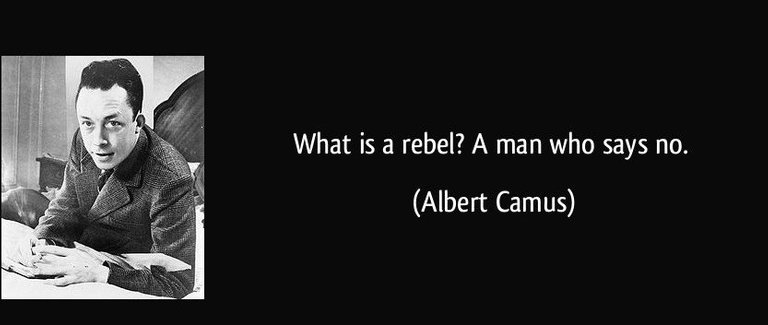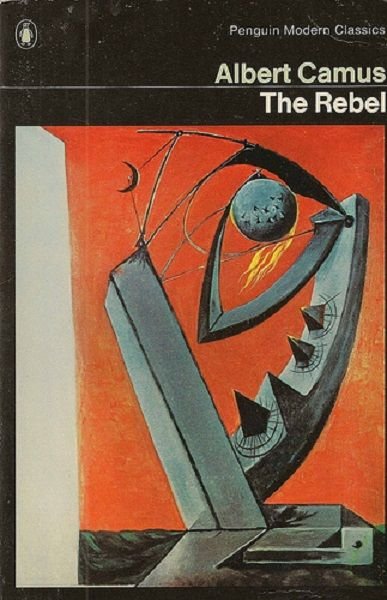The Rebel is a story of rebellion ideas - metaphysical and political - against unfair human deeds. If the main question in the "Myth of Sisyphus" is suicide, then "The Rebel " is concerned with the question of the justice of the murder. People have always murdered each other. The one who kills under the influence of affect is sued and then executed. But today the threat are not these crimes but the state leaders who coolly sent to death millions of people and justify mass murder with the interests of the nation, public safety, the progress of humanity and the logic of history. The man of the 20th century finds himself in the face of totalitarian ideologies that serve to justify the murders. More Pascal in Provincial Letters is appalled by Jesuit's Kazuisticianism, allowing murder in spite of the Christian orders. Undoubtedly, all churches bless the war against heretics, but every Christian knows the maxim "do not kill, because murder is a mortal sin," and the motto of the 20th century is "Kill." Camus in The Rebellious Man follows the genealogy of this maxim of modern ideologies. The problem is that these ideologies have been born out of ideas of rebellion, transforming into the nihilist "everything is allowed".
Camus believes that the starting point of his philosophy remains an absurdity, questioning all the values. Absurd, according to him, prohibits not only suicide but also murder. Own destruction means assassination of the unique source of the meaning of each person's life. One of the absurdities in the "Myth of Sisyphus" does not point out the revolt but affirms the self-worth of the other. The rebellion adds value to individual life, it is "a struggle with the superiority of the intellect", "a denial of reconciliation." Fighting the "plague" remains unreasonable in comparison with Caligula's bloodstaining or bloodshed. In Camus, notions such as absurd and rebellion change their content, hence not the individualistic mutiny, but the need for human solidarity and the common sense of existence for all. The renunciation of slavery simultaneously affirms the freedom, equality and human dignity of everyone. Every rebellious slave can reach this limit, but his desire to dominate makes him a bloody dictator. According to Camus, the revolutionary movement "has never separated from its moral, Christian and ideological roots." Today, the political rebellion has joined with the release of man from all values, and he is therefore involved in tyranny. The metaphysical rebellion itself has justification, so rebellion against the celestial universality of Demiurge means denial of reconciliation and affirmation of the merits of earthly existence. It becomes a denial of all values and engages in brutal self-will when the rebel proclaims himself a "man-god", inheriting from the rejected deity what he hates - absolutism, claims of last and final truth ("the truth is one, the delusions much ") and omniscience. In the earthly paradise, the new Prometheus is ready to demonstrate enormous strength, but even with the slightest resistance he is ready to make such a terror, compared to which the great Inquisition would be a childhood game. Such a compound of metaphysical and historical rebellion is mediated in the "German ideology". In the midst of the rebellious man's work, Camus spoke of "the evil geniuses of Europe bearing the names of philosophers: Hegel, Marx, and Nietzsche ... We live in this Europe, in Europe created by them." Not seeing the obvious differences in the views of these thinkers (and also of Feuerbach), Camus is uniting them in the "German ideology" that generates modern nihilism.

In order to understand his reasons for these thinkers included in the list of "evil geniuses," we first need to take into account the socio-political situation, and secondly, to take into account the angle Camus regards them. Camus wrote "The Rebel" in the 1950s, when the Stalinist system reached the apogee of its majesty, and Marxism became a world ideology. In Eastern Europe there are political courts, the USSR reports about millions arrested, the system is spreading in China, and the war in Korea begins, which may explode in Europe. Camus' political views change in the late 1940s, he no longer thinks of a revolution, tens of millions of victims have been paid to Europe. Camus remains a supporter of socialism. The Socialists strive to free the living people and not to sacrifice the lives of several generations to reach the earthly paradise. These sacrifices are not approaching, but distancing the "kingdom of man" - through the totalitarian regime, human freedom is being abolished. Camus admits a great deal of misinterpretation of the views of Hegel and Marx, but their views are fully understandable. He examines precisely these ideas, which enter into the Stalinist "canon" propagandizing as the only true teachings used to justify bureaucratic centralization and "leadership". In addition, he is arguing with Merlot-Ponty and Sartre wishing to justify totalitarianism with the help of Hegel's "Phenomenology of the Spirit," a study of "the totality of history." The story ceases to be a teacher of life, it is made of inexorable idols that are being offered to new victims. Transcendent values are dissolved in historical views, the laws of the economy engage humanity in the earthly paradise, but at the same time they destroy everyone who opposes them. Object of Camus' views is the tragedy of philosophy turning into "prophecy," into an ideology justifying the dominant terror. The deities of "German ideology" make history, the clergy of the new religion become propagandists and followers. "Prophecy" encompasses its own logic of development, which may have nothing to do with the good intentions of the philosopher-rebel. The question of the responsibility of the thinker, Camus puts quite rightly: neither Marx nor Nietzsche would approve the actions of their "disciples," but their theories can be adapted to the lessons of Kant or Tolstoy, Locke's political theories, or Montesquieu, did not need mass murders.

I have come to believe that most of the collectivist philosophy, Kant for instance, can be traced all the way back to Plato and his forms. Where as the teachings of Aristotle would lead to individualism through logic and reason. I can see the attraction Collectivism would have to powerful men, dictators, emperors etc. I feel like, regardless of Hegel or Marx intentions, they operated from an ideology flawed from it's very inception. From a philosopher kings' perspective, ounce you have the people placed in groups and rejecting their individuality for false altruism in the name of the greater good of society, they are much easier to herd. And it seems like this path has always been paved through propaganda in one form or another. Dividing people into groups, pitting them against each other. It's everywhere today. Sadly it seems Aristotle's teachings, logic and reason and the works of philosophers inspired by him have all but been erased from modern education. I don't think the current hostility and societal decay are unrelated. It's like we are losing our ability to have reasonable discussions. Propaganda is as prevalent as ever and the scary thing is how damn good at it the state has become. Excellent post! Really can't put a price on the value of content like this on Steemit.
In a very difficult topic you are thinking. I'm not sure whether we should limit Plato to such a type of teaching. Plato's political reasoning seems to me to be something that is not serious, his value is elsewhere. Irrationalism and Intuition of Incoming Christianity, Idealism. Removing the rational for me also has a positive side that is mystical and gives a claim that it is more than life. The rational enslave, cripples the imagination, and makes the person poorer. If you read "Candide" by Voltaire and the final of this work, when he comes to calmly and deny the imagination, this is for me an aristotelian ending. Yes, if we see the irrational from its political point of view, then it is pure evil, it only generates totalitarian regimes and deprives individuality.
Thank you for the comment. :)
I agree, it all comes down to balance. I actually liked Plato's early work. I think he was representing Socrates very well. His later work is where I diverge. I was coming from a strictly political direction on that. Imagination is the engine of creation and progress. Thank you for posting thought provoking content! 👍👍👍
I read that this means to him to look for meaning in a world without none, but isn't that self defeating?
That would be self-defeating, but that's not his position. He doesn't claim that you should continue to look for meaning. Rather, you should accept the meaninglessness of your existence, as a sort of spiteful rebellion against the absurdity that is life. I don't recall any good philosophical reason that Camus gives us to take this line of reasoning, but that's pretty much the angle he is going for.
Does he not really mean to enjoy life while accepting that life and the universe has no intrinsic meaning?
As long as your enjoyment isn't generated from something that acts as an escape from you facing your meaningless - then yes.
@godflesh
Good thoughts :) Have you read his book "Myth of Sisyphus". I think there his philosophical concept is expressed most clearly and simply. The book is very small and readily readable. I recommend it to you if you still have not read it. :)
Good post
@godflesh
Thank you :)
yes
:)
The only way to deal with an unfree world is to become so absolutely free that your very existence is an act of rebellion.
#Ac
True :)
I’ve never read Camus. For no reason than I simply haven’t read his work.
This sounds interesting, and I’ve been contemplating similar things recently, as I’m finding myself disillusioned with a lot of ‘thought’.
I’m wondering if indeed I am becoming more cynically nihilistic in my old age, which kind of terrifies me on one hand - but on the other I feel there really isn’t a point to being ‘attached’ to any one belief or theory.
Anyway, this is the context for me to have my curiosity piqued in this book.
Thanks for the review.
😊🙏🏽☯️
Thank you for the comment :)
i liket it, Yes live with hope. We need that!
resteem to u
Thanks
Such a lovely article....
It is wonderful to read it
Thanks :)
You got a 6.04% upvote from @postpromoter courtesy of @godflesh!
Want to promote your posts too? Check out the Steem Bot Tracker website for more info. If you would like to support the development of @postpromoter and the bot tracker please vote for @yabapmatt for witness!